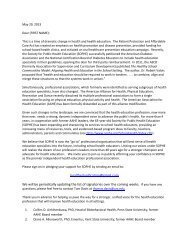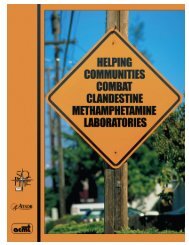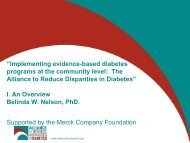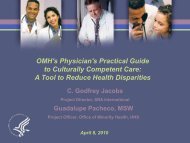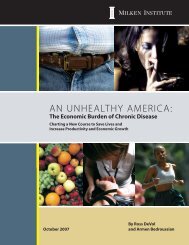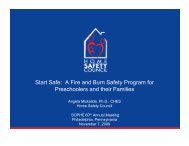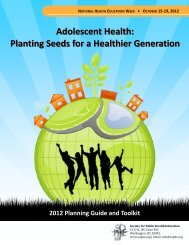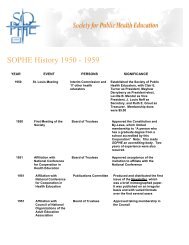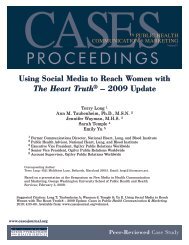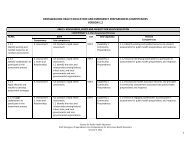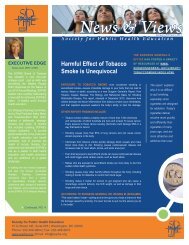healthy people 2020 - Society for Public Health Education
healthy people 2020 - Society for Public Health Education
healthy people 2020 - Society for Public Health Education
Create successful ePaper yourself
Turn your PDF publications into a flip-book with our unique Google optimized e-Paper software.
✯ Conference Abstracts ✯<br />
thursday | november 4<br />
pre-conference skill-building workshop i<br />
thur / nov 4 / 1:00 pm – 5:00 pm / Room: Molly Brown<br />
Evaluation: A Key Tool to the Trade<br />
Richard Windsor, Ms, PhD, MPH, George Washington<br />
University School of <strong>Public</strong> <strong>Health</strong><br />
The objective of almost all <strong>Health</strong> Promotion-Disease Prevention (HP-<br />
DP) Programs (and proposals) is to produce data/insight about the<br />
“effectiveness” of a new policy, intervention, and/or evidenced based<br />
practice(s) <strong>for</strong> a specific health problem, population at risk, and practice<br />
setting. This Workshop will provide a synthesis of salient conceptual,<br />
methodological, and design issues routinely faced by professionals in<br />
practice. Case material from multiple, peer reviewed/funded proposals<br />
and completed Process, Impact, and Cost-Effectiveness Evaluations<br />
will be presented. Published evaluations discussed in Professor Windsor’s<br />
textbook: “Evaluation of <strong>Health</strong> Promotion-Disease Prevention<br />
Programs; Improving Population <strong>Health</strong> Through Evidenced Based<br />
Professional Practice, 4th Edition” will be used to provide specific<br />
examples about how on-going public health programs can select and<br />
apply rigorous methods. Textbook included in workshop fee.<br />
pre-conference skill-building workshop ii<br />
thur / nov 4 / 2:00 pm – 5:00 pm / Room: Matchless<br />
The Spirit of <strong>Health</strong> Resides in the People of the Land:<br />
Healing Our Community<br />
Pamela Jumper-Thurman, MA, PhD, Senior Research Scientist/Scholar-<br />
Ethnic Studies at Colorado State University, Fort Collins, CO, Research<br />
Supervisor- Community Readiness and HIV/AIDS Capacity Building supplemented<br />
by Centers <strong>for</strong> Disease Control; Martha A. Burnside, BA, National<br />
Center <strong>for</strong> Community Readiness, Ethnic Studies Department, Colorado<br />
State University<br />
Participants will gain an understanding of Native American beliefs, values<br />
and traditions that can influence the population’s health outcomes.<br />
Discussions will focus on cultural competencies and responsibilities<br />
of health education specialists to be knowledgeable and equipped with<br />
strategies to work effectively within Native American communities.<br />
This session will introduce an effective health behavior change model<br />
used within Native communities. The Community Readiness Model<br />
(CRM) is a nine stage, multi-dimensional model to facilitate community<br />
change. The model was developed 17 years ago by the research<br />
staff at the Tri-Ethnic Center at Colorado State University. Presenting<br />
at this workshop will be two of the original developers of the CRM. The<br />
model is community-specific and issue specific and is designed to build<br />
cooperation among systems and individuals. The Community Readiness<br />
model has been used in Native communities throughout the United<br />
States and Canada. It has been used <strong>for</strong> mobilizing a community to<br />
develop intervention strategies <strong>for</strong> prevention of HIV/AIDS, drug and<br />
alcohol use, intimate partner violence, suicide, and many other topics.<br />
When applied to prevention of a social concern, community readiness determines<br />
and guides the timing <strong>for</strong> each step of ef<strong>for</strong>ts aimed at changing community<br />
norms, behaviors and attitudes. It utilizes key respondent interviews<br />
to determine readiness based on six dimensions: 1) local programs currently<br />
existing that address your issue; 2) community knowledge of existing ef<strong>for</strong>ts;<br />
3) involvement of leadership; 4) community climate (overall “energy” of the<br />
thursday | november 4<br />
community); 5) knowledge of the issue, and 6) resources within the community<br />
available <strong>for</strong> addressing the issue. The result of a Community Readiness<br />
assessment is a “community diagnostic” <strong>for</strong> intervention.<br />
pre-conference skill-building workshop iii<br />
thur / nov 4 / 6:00 pm – 9:00 pm / Room: Molly Brown<br />
Is Your <strong>Health</strong> Web Site Easy to Use? Strategies <strong>for</strong> Improving<br />
<strong>Health</strong> Literacy and the Web<br />
Xanthi Scrimgeour, MHEd, CHES, Communicate<strong>Health</strong>, Inc.,<br />
Stacy Robinson, MPH, CHES, Communicate<strong>Health</strong>, Inc.<br />
Today, more Americans are turning to the Internet <strong>for</strong> health in<strong>for</strong>mation<br />
than ever be<strong>for</strong>e. In response, there is growing demand <strong>for</strong> accurate, understandable,<br />
and appropriate health content to meet consumers’ evolving<br />
in<strong>for</strong>mation needs. However, many Americans do not have the skills they<br />
need to obtain, interpret, and use health in<strong>for</strong>mation effectively. During<br />
this interactive workshop, participants will discuss the practical implications<br />
and challenges of creating online health content <strong>for</strong> the roughly 93<br />
million adults in the United States with limited health literacy skills. We<br />
will review best practices from the fields of usability, health literacy, and<br />
user-centered design and discuss their significance <strong>for</strong> health promotion.<br />
We will explore the ways in which our communication skills as health<br />
educators can improve the health literacy of our priority populations. The<br />
workshop will focus on specific techniques <strong>for</strong> improving health literacy<br />
through Web site design, navigation, and content.<br />
pre-conference skill-building workshop iv<br />
thur / nov 4 / 6:00 pm – 9:00 pm / Room: Denver 3<br />
The Future is in Your Hands: Key Components of Professional<br />
Preparation and Success<br />
Melinda Ickes, MEd, PhD University of Kentucky & SOPHE Student<br />
Trustee; Kelli McCormack Brown, PhD, Associate Dean & Professor,<br />
University of Florida; and Robert McDermott, PhD, Professor, University of<br />
South Florida<br />
Whether you are a student considering where you are headed in the future,<br />
a new professional wondering how to be a successful health educator, or a<br />
veteran in the field looking to expand your horizons, this workshop is <strong>for</strong><br />
you. Many individuals enter the field of public health education and health<br />
promotion with great dreams and aspirations. However, taking the next step<br />
– be it graduate level study, gaining work-related experience, or finding that<br />
dream job – can be quite overwhelming. The purpose of this workshop is to<br />
give participants the opportunity to learn more about the key components of<br />
professional preparation and success. Questions related to discovering the right<br />
career path, understanding potential settings <strong>for</strong> employment, and determining<br />
the next steps will be discussed. Current health professionals representing<br />
a variety of fields will be on hand to share their perspectives related to the job<br />
search process, roles and responsibilities within their particular career, deciding<br />
if a graduate program is the right choice, and the importance of networking.<br />
Participants will be given the opportunity to engage in self-reflective and<br />
hands-on activities including: resume building, interviewing with confidence,<br />
and fostering a successful career.<br />
pre-conference skill-building workshop v<br />
thur / nov 4 / 6:00 pm – 8:00 pm / Room: Gold Coin<br />
SABPAC 101: For Faculty and Practitioners<br />
Ellen M. Capwell, PhD, CHES, Co-chair, SABPAC and Professor,<br />
Department of <strong>Health</strong> and Sport Science, Otterbein College<br />
sophe conference ✯ november 4-6, 2010 13




